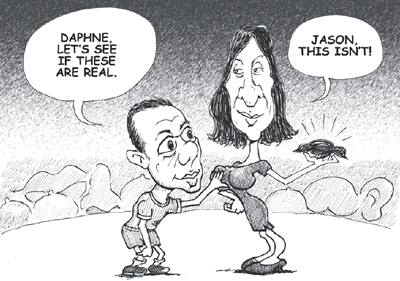The General Workers’ Union memorandum to the political parties makes riveting reading. It contains a number of noteworthy proposals which, if given due consideration, could serve as a building bloc for a more transparent society.
Essentially the union is calling for the scrutiny of high powered appointments, a call repeatedly made by a number of organisations, as well as for the publication of a lobbyist’s diary: a novel idea, through which the general public would get to know what lobby groups or individuals the politicians are meeting.
In keeping with the maxim that sunshine is the best disinfectant, these proposals would help remove any suspicions at all on possible conflict of interest situations and in so doing will help ameliorate the public’s perception of politics.
The scrutiny of high-powered appointments is vital, since chairmen and directors of government boards, authorities and institutions often take decisions carrying high pecuniary interests. Our country should indeed follow the American experience whereby appointees are grilled and questioned before their approval. Such a procedure can easily be implemented in our country with the setting up of a special parliamentary committee with a “licence to grill”, that can serve as a golden opportunity for the appointee to make known his or her credentials for the job and his or her vision for the mission he is to carry out.
The GWU suggestion of a lobbyist’s diary is innovative and carries implications which can go a long way towards explaining the networking and peddling of influence which inevitably takes place in all government circles. This diary would allow people to know, just as in the case of the president’s daily engagements, what organisations or people ministers are coming into contact with, and to what purpose. This transparent daily diary would simply lift the lid on much influence peddling that darkens the corridors of power.
Recent events have magnified the need for such transparency. The case of practising architects sitting on prominent Mepa boards is a case in point: it foments the prevailing tendency for applicants to pick and choose their architect according to his being a member of the board. This is a negation of transparency even in cases where the sitting architect abstains from participating in the decision.
Equally alarming is the case of appointed chairmen whose direct line of business is also the core business of the company he is chairing at board level. It is naive to even suppose that such appointees will not be privy to inside information, which can have substantial pecuniary value to his personal company interests. Corruption need not be limited to the exchange of a bribe for favours, but it can also manifest itself in the form of use of public office for private gain. The argument all too easily used is that knowledge of the particular line of business places the occupant in a better position to render sterling service. We have a different view, and believe that competence, attention to detail and honesty are stronger foundations than merely knowledge of the business, which with the passage of time can be acquired. What is crucial is that appointees, once chosen, are given a finite term of office, and that new faces are periodically introduced to smash the impression of an occasional game of musical chairs taking place with the same people appointed to different positions.
Now that we are embarking on a European way of doing politics, hopefully we will aspire to the high standards of northern (and not southern) Europe where governments have been pioneers in opening wide open the corridors of power, with the direct intention of increasing and not decreasing the popular sentiment to politics.
Disengagement, especially of the younger sections of society and of many minority groups, only helps breed unease about politics, which in the final analysis remains a mission and a wonderful tool for improving society.

